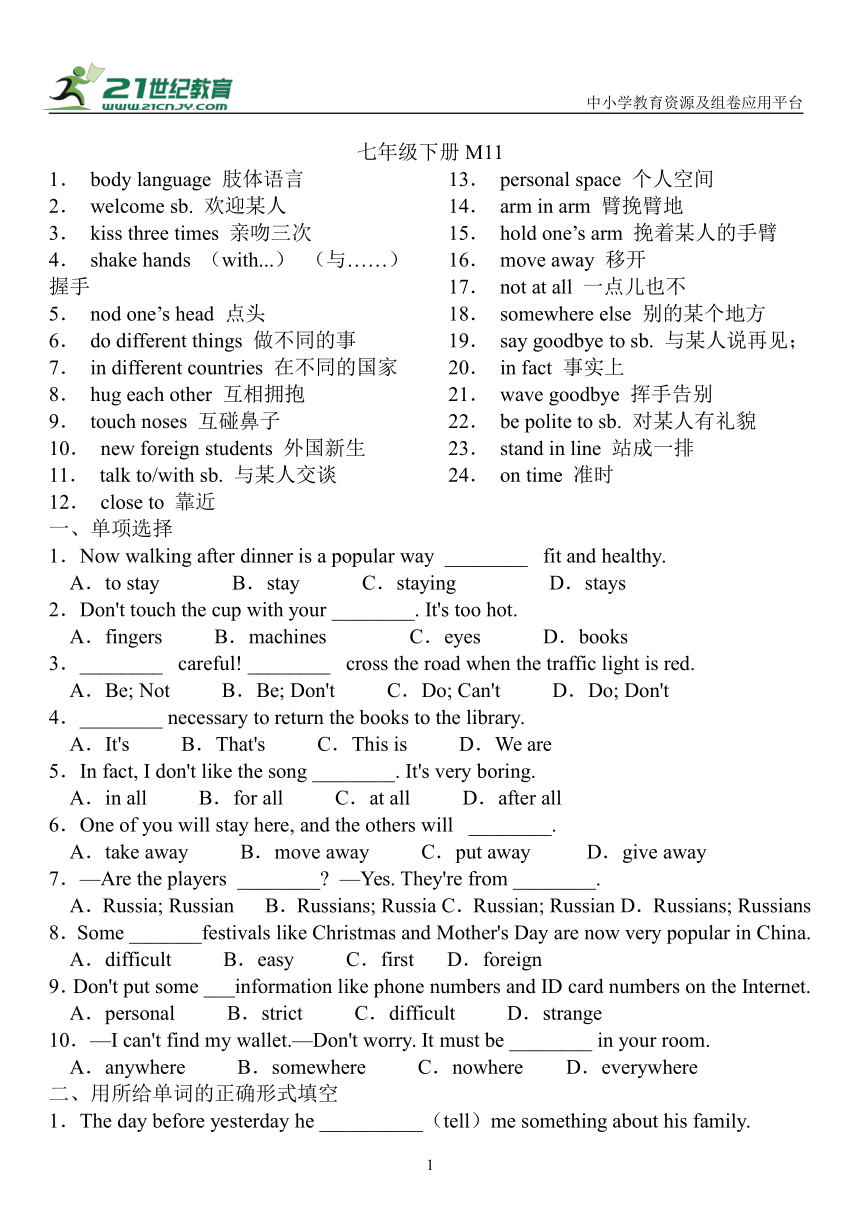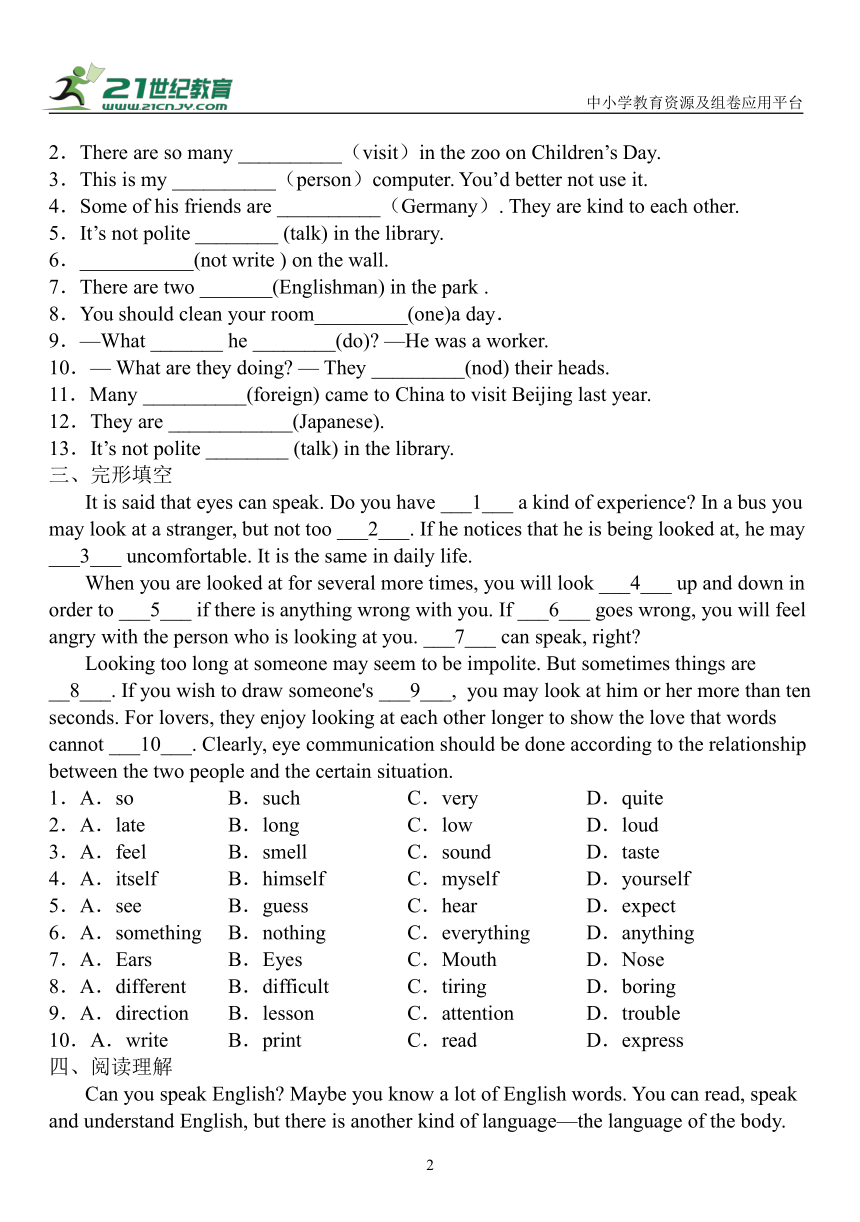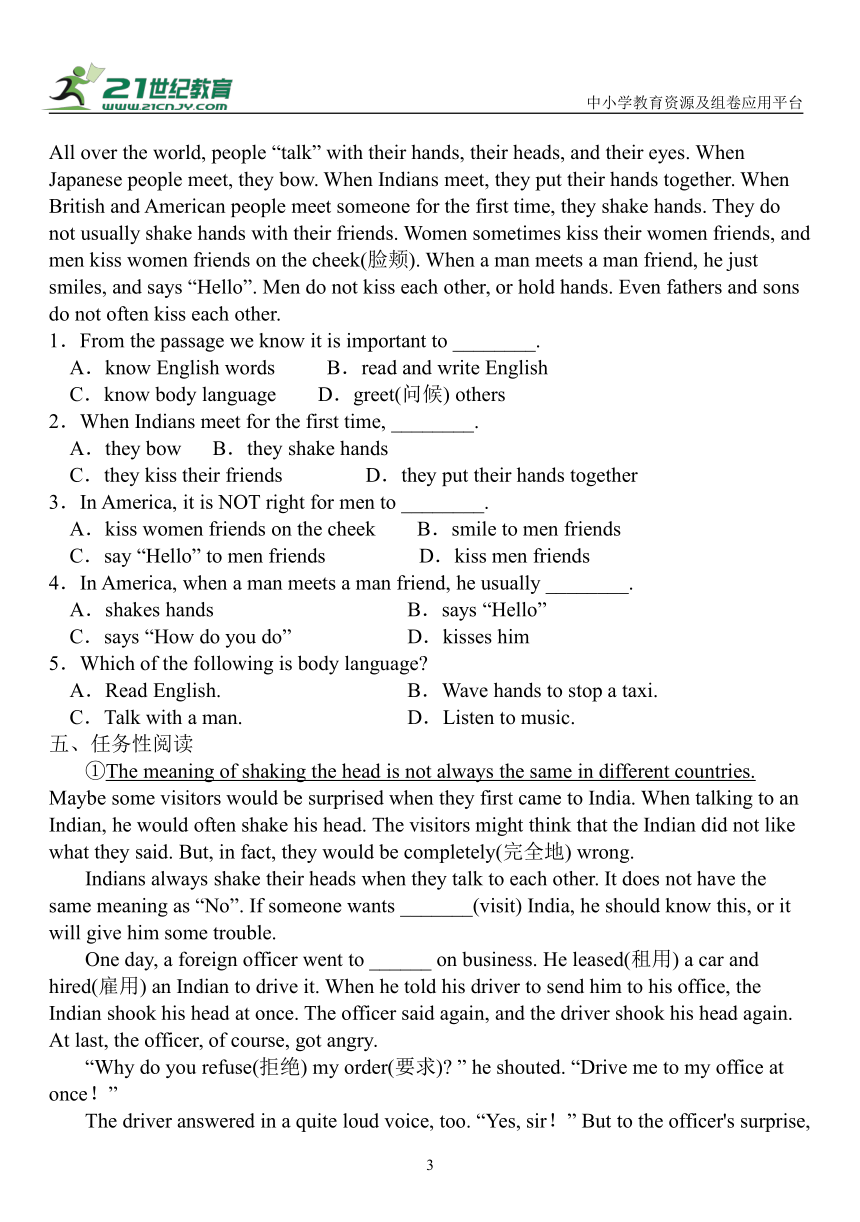Module 11 Body language 短语整理+同步练习(含答案)
文档属性
| 名称 | Module 11 Body language 短语整理+同步练习(含答案) |

|
|
| 格式 | docx | ||
| 文件大小 | 144.6KB | ||
| 资源类型 | 试卷 | ||
| 版本资源 | 外研版 | ||
| 科目 | 英语 | ||
| 更新时间 | 2023-06-25 00:00:00 | ||
图片预览



文档简介
中小学教育资源及组卷应用平台
七年级下册M11
1. body language 肢体语言
2. welcome sb. 欢迎某人
3. kiss three times 亲吻三次
4. shake hands (with...) (与……)握手
5. nod one’s head 点头
6. do different things 做不同的事
7. in different countries 在不同的国家
8. hug each other 互相拥抱
9. touch noses 互碰鼻子
10. new foreign students 外国新生
11. talk to/with sb. 与某人交谈
12. close to 靠近
13. personal space 个人空间
14. arm in arm 臂挽臂地
15. hold one’s arm 挽着某人的手臂
16. move away 移开
17. not at all 一点儿也不
18. somewhere else 别的某个地方
19. say goodbye to sb. 与某人说再见;20. in fact 事实上
21. wave goodbye 挥手告别
22. be polite to sb. 对某人有礼貌
23. stand in line 站成一排
24. on time 准时
一、单项选择
1.Now walking after dinner is a popular way ________ fit and healthy.
A.to stay B.stay C.staying D.stays
2.Don't touch the cup with your ________. It's too hot.
A.fingers B.machines C.eyes D.books
3.________ careful! ________ cross the road when the traffic light is red.
A.Be; Not B.Be; Don't C.Do; Can't D.Do; Don't
4.________ necessary to return the books to the library.
A.It's B.That's C.This is D.We are
5.In fact, I don't like the song ________. It's very boring.
A.in all B.for all C.at all D.after all
6.One of you will stay here, and the others will ________.
A.take away B.move away C.put away D.give away
7.—Are the players ________ —Yes. They're from ________.
A.Russia; Russian B.Russians; Russia C.Russian; Russian D.Russians; Russians
8.Some _______festivals like Christmas and Mother's Day are now very popular in China.
A.difficult B.easy C.first D.foreign
9.Don't put some ___information like phone numbers and ID card numbers on the Internet.
A.personal B.strict C.difficult D.strange
10.—I can't find my wallet.—Don't worry. It must be ________ in your room.
A.anywhere B.somewhere C.nowhere D.everywhere
二、用所给单词的正确形式填空
1.The day before yesterday he __________(tell)me something about his family.
2.There are so many __________(visit)in the zoo on Children’s Day.
3.This is my __________(person)computer. You’d better not use it.
4.Some of his friends are __________(Germany). They are kind to each other.
5.It’s not polite ________ (talk) in the library.
6.___________(not write ) on the wall.
7.There are two _______(Englishman) in the park .
8.You should clean your room_________(one)a day.
9.—What _______ he ________(do) —He was a worker.
10.— What are they doing — They _________(nod) their heads.
11.Many __________(foreign) came to China to visit Beijing last year.
12.They are ____________(Japanese).
13.It’s not polite ________ (talk) in the library.
三、完形填空
It is said that eyes can speak. Do you have ___1___ a kind of experience In a bus you may look at a stranger, but not too ___2___. If he notices that he is being looked at, he may ___3___ uncomfortable. It is the same in daily life.
When you are looked at for several more times, you will look ___4___ up and down in order to ___5___ if there is anything wrong with you. If ___6___ goes wrong, you will feel angry with the person who is looking at you. ___7___ can speak, right
Looking too long at someone may seem to be impolite. But sometimes things are __8___. If you wish to draw someone's ___9___, you may look at him or her more than ten seconds. For lovers, they enjoy looking at each other longer to show the love that words cannot ___10___. Clearly, eye communication should be done according to the relationship between the two people and the certain situation.
1.A.so B.such C.very D.quite
2.A.late B.long C.low D.loud
3.A.feel B.smell C.sound D.taste
4.A.itself B.himself C.myself D.yourself
5.A.see B.guess C.hear D.expect
6.A.something B.nothing C.everything D.anything
7.A.Ears B.Eyes C.Mouth D.Nose
8.A.different B.difficult C.tiring D.boring
9.A.direction B.lesson C.attention D.trouble
10.A.write B.print C.read D.express
四、阅读理解
Can you speak English Maybe you know a lot of English words. You can read, speak and understand English, but there is another kind of language—the language of the body. All over the world, people “talk” with their hands, their heads, and their eyes. When Japanese people meet, they bow. When Indians meet, they put their hands together. When British and American people meet someone for the first time, they shake hands. They do not usually shake hands with their friends. Women sometimes kiss their women friends, and men kiss women friends on the cheek(脸颊). When a man meets a man friend, he just smiles, and says “Hello”. Men do not kiss each other, or hold hands. Even fathers and sons do not often kiss each other.
1.From the passage we know it is important to ________.
A.know English words B.read and write English
C.know body language D.greet(问候) others
2.When Indians meet for the first time, ________.
A.they bow B.they shake hands
C.they kiss their friends D.they put their hands together
3.In America, it is NOT right for men to ________.
A.kiss women friends on the cheek B.smile to men friends
C.say “Hello” to men friends D.kiss men friends
4.In America, when a man meets a man friend, he usually ________.
A.shakes hands B.says “Hello”
C.says “How do you do” D.kisses him
5.Which of the following is body language
A.Read English. B.Wave hands to stop a taxi.
C.Talk with a man. D.Listen to music.
五、任务性阅读
①The meaning of shaking the head is not always the same in different countries. Maybe some visitors would be surprised when they first came to India. When talking to an Indian, he would often shake his head. The visitors might think that the Indian did not like what they said. But, in fact, they would be completely(完全地) wrong.
Indians always shake their heads when they talk to each other. It does not have the same meaning as “No”. If someone wants _______(visit) India, he should know this, or it will give him some trouble.
One day, a foreign officer went to ______ on business. He leased(租用) a car and hired(雇用) an Indian to drive it. When he told his driver to send him to his office, the Indian shook his head at once. The officer said again, and the driver shook his head again. At last, the officer, of course, got angry.
“Why do you refuse(拒绝) my order(要求) ” he shouted. “Drive me to my office at once!”
The driver answered in a quite loud voice, too. “Yes, sir!” But to the officer's surprise, the driver shook his head at the same time.
The car started, and the foreign officer was now too surprised to say a word. He thought about it for a while, and then ④he_nodded_with_a_smile,_‘No’ means ‘Yes’ here! ”
1.写出句①的同义句。
________________________________________________________
2.②处用括号内所给词的适当形式填空。
________________________________________________________
3.根据短文内容在③处填入一个合适的国家名。
________________________________________________________
4.将④处的内容翻译成汉语。
________________________________________________________
5.根据短文内容回答问题。
What does shaking head mean in India, yes or no
________________________________________________________
六、书面表达
中国和美国的课堂是有一些差异的,请根据下列表格中的信息描述一下这些差异,并谈谈自己的看法。60词以上。
中国课堂 美国课堂
不直呼老师的姓名 (2)认真听课、做笔记 (3)举手发言 (1)学生面对面坐 (2)比较放松,可以喝饮料 (3)自由讨论
参考词汇:face to face面对面;freely自由地
______________________________________________________________________________________________________________________________________________________________________________________________________________________________________________________________________________________________________________________________________________________________________________________________________________________________________________________
_________________________________________________________________________
__________________________________________________________________________________________________________________________________________________
_________________________________________________________________________
_________________________________________________________________________
答案
一、单项选择。
1-5AABAC 6-10 BBDAB
二、用所给单词的正确形式填空
1. told 2. visitors 3. personal 4.German 5. to talk 6. Englishmen 7. once 8. did do 9. are nodding 10. foreigners 11. Japanese 12. to talk
三、完形填空
1-5BBADA 6-10 BBACD
四、阅读理解
CDDBB
五、任务阅读
1.Sometimes the meaning of shaking the head is different in different countries.
2.to visit.
3. India.
4. 他微笑着点头
5.It means yes.
六、书面表达
There are some differences between a Chinese class and an American class. Now let’s have a look.
In China, students call their teachers with “Mr” or “Ms”. In class, they always listen to teachers and take notes carefully. If they want to say something, they should put up their hands first.
But in America, it’s very different from that in China. The students sit around desks face to face. They can drink in class and they can talk freely too. But I think the Chinese class is better. It’s polite of the students to obey the school rules.
七年级下册M11
1. body language 肢体语言
2. welcome sb. 欢迎某人
3. kiss three times 亲吻三次
4. shake hands (with...) (与……)握手
5. nod one’s head 点头
6. do different things 做不同的事
7. in different countries 在不同的国家
8. hug each other 互相拥抱
9. touch noses 互碰鼻子
10. new foreign students 外国新生
11. talk to/with sb. 与某人交谈
12. close to 靠近
13. personal space 个人空间
14. arm in arm 臂挽臂地
15. hold one’s arm 挽着某人的手臂
16. move away 移开
17. not at all 一点儿也不
18. somewhere else 别的某个地方
19. say goodbye to sb. 与某人说再见;20. in fact 事实上
21. wave goodbye 挥手告别
22. be polite to sb. 对某人有礼貌
23. stand in line 站成一排
24. on time 准时
一、单项选择
1.Now walking after dinner is a popular way ________ fit and healthy.
A.to stay B.stay C.staying D.stays
2.Don't touch the cup with your ________. It's too hot.
A.fingers B.machines C.eyes D.books
3.________ careful! ________ cross the road when the traffic light is red.
A.Be; Not B.Be; Don't C.Do; Can't D.Do; Don't
4.________ necessary to return the books to the library.
A.It's B.That's C.This is D.We are
5.In fact, I don't like the song ________. It's very boring.
A.in all B.for all C.at all D.after all
6.One of you will stay here, and the others will ________.
A.take away B.move away C.put away D.give away
7.—Are the players ________ —Yes. They're from ________.
A.Russia; Russian B.Russians; Russia C.Russian; Russian D.Russians; Russians
8.Some _______festivals like Christmas and Mother's Day are now very popular in China.
A.difficult B.easy C.first D.foreign
9.Don't put some ___information like phone numbers and ID card numbers on the Internet.
A.personal B.strict C.difficult D.strange
10.—I can't find my wallet.—Don't worry. It must be ________ in your room.
A.anywhere B.somewhere C.nowhere D.everywhere
二、用所给单词的正确形式填空
1.The day before yesterday he __________(tell)me something about his family.
2.There are so many __________(visit)in the zoo on Children’s Day.
3.This is my __________(person)computer. You’d better not use it.
4.Some of his friends are __________(Germany). They are kind to each other.
5.It’s not polite ________ (talk) in the library.
6.___________(not write ) on the wall.
7.There are two _______(Englishman) in the park .
8.You should clean your room_________(one)a day.
9.—What _______ he ________(do) —He was a worker.
10.— What are they doing — They _________(nod) their heads.
11.Many __________(foreign) came to China to visit Beijing last year.
12.They are ____________(Japanese).
13.It’s not polite ________ (talk) in the library.
三、完形填空
It is said that eyes can speak. Do you have ___1___ a kind of experience In a bus you may look at a stranger, but not too ___2___. If he notices that he is being looked at, he may ___3___ uncomfortable. It is the same in daily life.
When you are looked at for several more times, you will look ___4___ up and down in order to ___5___ if there is anything wrong with you. If ___6___ goes wrong, you will feel angry with the person who is looking at you. ___7___ can speak, right
Looking too long at someone may seem to be impolite. But sometimes things are __8___. If you wish to draw someone's ___9___, you may look at him or her more than ten seconds. For lovers, they enjoy looking at each other longer to show the love that words cannot ___10___. Clearly, eye communication should be done according to the relationship between the two people and the certain situation.
1.A.so B.such C.very D.quite
2.A.late B.long C.low D.loud
3.A.feel B.smell C.sound D.taste
4.A.itself B.himself C.myself D.yourself
5.A.see B.guess C.hear D.expect
6.A.something B.nothing C.everything D.anything
7.A.Ears B.Eyes C.Mouth D.Nose
8.A.different B.difficult C.tiring D.boring
9.A.direction B.lesson C.attention D.trouble
10.A.write B.print C.read D.express
四、阅读理解
Can you speak English Maybe you know a lot of English words. You can read, speak and understand English, but there is another kind of language—the language of the body. All over the world, people “talk” with their hands, their heads, and their eyes. When Japanese people meet, they bow. When Indians meet, they put their hands together. When British and American people meet someone for the first time, they shake hands. They do not usually shake hands with their friends. Women sometimes kiss their women friends, and men kiss women friends on the cheek(脸颊). When a man meets a man friend, he just smiles, and says “Hello”. Men do not kiss each other, or hold hands. Even fathers and sons do not often kiss each other.
1.From the passage we know it is important to ________.
A.know English words B.read and write English
C.know body language D.greet(问候) others
2.When Indians meet for the first time, ________.
A.they bow B.they shake hands
C.they kiss their friends D.they put their hands together
3.In America, it is NOT right for men to ________.
A.kiss women friends on the cheek B.smile to men friends
C.say “Hello” to men friends D.kiss men friends
4.In America, when a man meets a man friend, he usually ________.
A.shakes hands B.says “Hello”
C.says “How do you do” D.kisses him
5.Which of the following is body language
A.Read English. B.Wave hands to stop a taxi.
C.Talk with a man. D.Listen to music.
五、任务性阅读
①The meaning of shaking the head is not always the same in different countries. Maybe some visitors would be surprised when they first came to India. When talking to an Indian, he would often shake his head. The visitors might think that the Indian did not like what they said. But, in fact, they would be completely(完全地) wrong.
Indians always shake their heads when they talk to each other. It does not have the same meaning as “No”. If someone wants _______(visit) India, he should know this, or it will give him some trouble.
One day, a foreign officer went to ______ on business. He leased(租用) a car and hired(雇用) an Indian to drive it. When he told his driver to send him to his office, the Indian shook his head at once. The officer said again, and the driver shook his head again. At last, the officer, of course, got angry.
“Why do you refuse(拒绝) my order(要求) ” he shouted. “Drive me to my office at once!”
The driver answered in a quite loud voice, too. “Yes, sir!” But to the officer's surprise, the driver shook his head at the same time.
The car started, and the foreign officer was now too surprised to say a word. He thought about it for a while, and then ④he_nodded_with_a_smile,_‘No’ means ‘Yes’ here! ”
1.写出句①的同义句。
________________________________________________________
2.②处用括号内所给词的适当形式填空。
________________________________________________________
3.根据短文内容在③处填入一个合适的国家名。
________________________________________________________
4.将④处的内容翻译成汉语。
________________________________________________________
5.根据短文内容回答问题。
What does shaking head mean in India, yes or no
________________________________________________________
六、书面表达
中国和美国的课堂是有一些差异的,请根据下列表格中的信息描述一下这些差异,并谈谈自己的看法。60词以上。
中国课堂 美国课堂
不直呼老师的姓名 (2)认真听课、做笔记 (3)举手发言 (1)学生面对面坐 (2)比较放松,可以喝饮料 (3)自由讨论
参考词汇:face to face面对面;freely自由地
______________________________________________________________________________________________________________________________________________________________________________________________________________________________________________________________________________________________________________________________________________________________________________________________________________________________________________________
_________________________________________________________________________
__________________________________________________________________________________________________________________________________________________
_________________________________________________________________________
_________________________________________________________________________
答案
一、单项选择。
1-5AABAC 6-10 BBDAB
二、用所给单词的正确形式填空
1. told 2. visitors 3. personal 4.German 5. to talk 6. Englishmen 7. once 8. did do 9. are nodding 10. foreigners 11. Japanese 12. to talk
三、完形填空
1-5BBADA 6-10 BBACD
四、阅读理解
CDDBB
五、任务阅读
1.Sometimes the meaning of shaking the head is different in different countries.
2.to visit.
3. India.
4. 他微笑着点头
5.It means yes.
六、书面表达
There are some differences between a Chinese class and an American class. Now let’s have a look.
In China, students call their teachers with “Mr” or “Ms”. In class, they always listen to teachers and take notes carefully. If they want to say something, they should put up their hands first.
But in America, it’s very different from that in China. The students sit around desks face to face. They can drink in class and they can talk freely too. But I think the Chinese class is better. It’s polite of the students to obey the school rules.
同课章节目录
- Module 1 Lost and found
- Unit 1 Whose bag is this?
- Unit 2 Are they yours?
- Unit 3 Language in use
- Module 2 What can you do ?
- Unit 1 I can play the piano
- Unit 2 I can run really fast
- Unit 3 Language in use
- Module 3 Making plans
- Unit 1 What are you going to do at the weekends?
- Unit 2 We're going to cheer the players.
- Unit 3 Language in use
- Module 4 Life in the future
- Unit 1 Everyone will study at home
- Unit 2 Every family will have a small plane.
- Unit 3 Language in use
- Module 5 Shopping
- Unit 1 What can I do for you?
- Unit 2 You can buy everything on the Internet
- Unit 3 Language in use
- Module 6 Around town
- Unit 1 Could you tell me how to get to the Nationa
- Unit 2 The London Eye is on your right.
- Unit 3 Language in use
- Revision module A
- Module 7 My past life
- Unit 1 I was born in a small village.
- Unit 2 I was born in Quincy.
- Unit 3 Language in use
- Module 8 Story time
- Unit 1 Once upon a time….
- Unit 2 Goldilocks hurried out of the house.
- Unit 3 Language in use
- Module 9 Life history
- Unit 1 He left school and began work at the age of
- Unit 2 He decided to be an actor.
- Unit 3 Language in use
- Module 10 A holiday journey
- Unit 1 What did you do?
- Unit 2 This morning we took a walk.
- Unit 3 Language in use
- Module 11 Body language
- Unit 1 They touch noses!
- Unit 2 Here are some ways to welcome them.
- Unit 3 Language in use
- Module 12 Western music
- Unit 1 It's so beautiful!
- Unit 2 Vienna is the centre of European classical
- Unit 3 Language in use
- Revision module B
